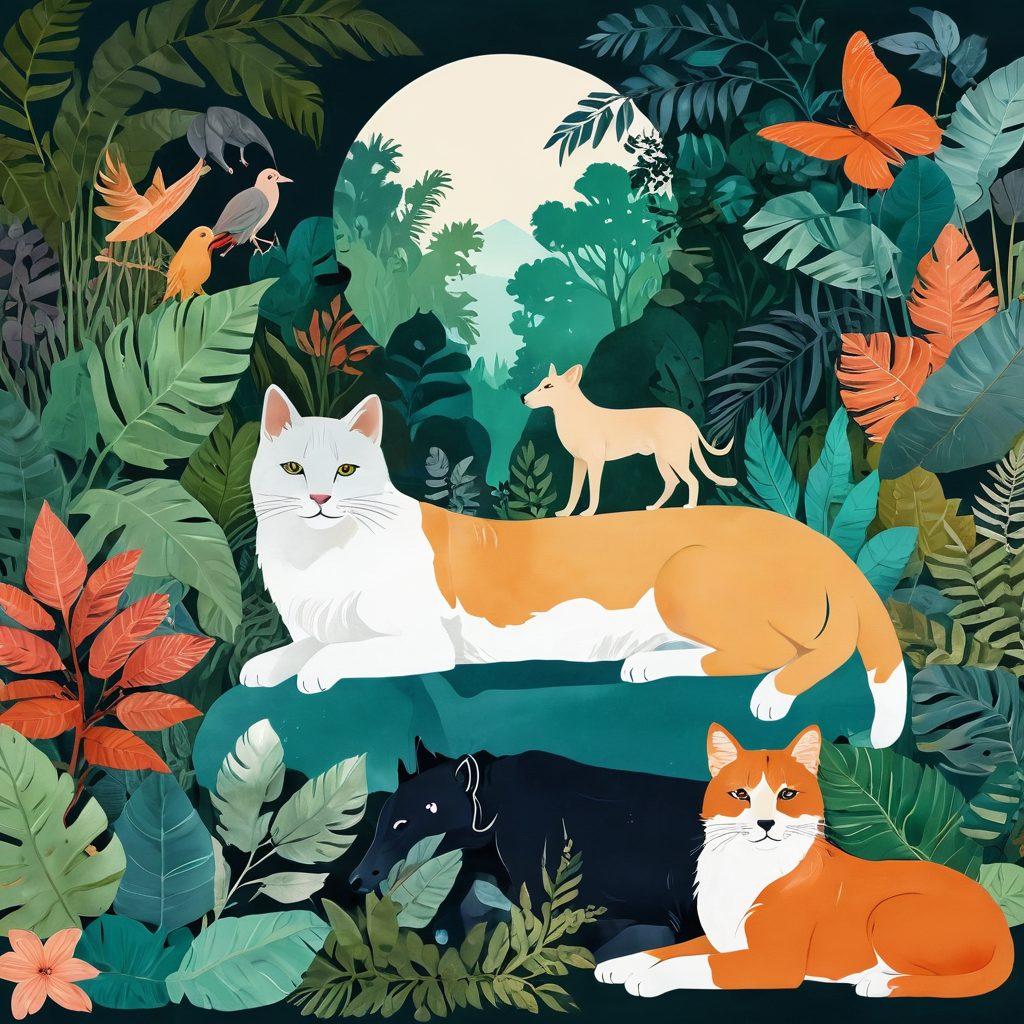Exploring the Wild Side: Understanding Animal Sexuality and Behavior for Pet Owners and Animal Lovers
Have you ever watched your pets interact and wondered what was going on in their minds? Animal sexuality and behavior can often seem mysterious to many pet owners and animal lovers alike. But understanding these natural instincts is crucial for ensuring that our pets are happy, healthy, and fulfilling their needs. Whether you're a cat person, a dog lover, or an admirer of exotic pets, this blog will delve into the fascinating world of animal intimacy and the secrets that lie beneath the surface of animal companionship. Just like humans, animals have unique sexual behaviors that contribute significantly to their well-being and social interactions.
First, let's consider the different ways animals express their sexuality. From the playful antics of dogs chasing each other in the backyard to the more subtle courtship dances of birds, the realm of animal behavior is richer than we might realize. Have you ever seen two cats engage in a friendly tussle? It might look like a playful fight, but it's often part of their mating rituals. Understanding these behaviors can empower you as a pet owner to create a nurturing environment that respects your pets' instincts. In fact, learning about animal sexuality can drastically improve your pet care tips and enhance your animal's life.
The concept of ethical pet ownership is ever-important in light of wildlife observation and conservation efforts. By understanding sexual behavior in animals, you can better appreciate their needs, which is essential for responsible pet ownership. Take time to observe how your companion animals interact, be it through play or grooming, and witness the beautiful dance of intimacy that helps build their social structures. If you're thinking about pet adoption, recognizing a potential pet’s sexual behavior can help you select a companion whose needs are a good match for your household.
Training your pet goes beyond just teaching them commands; it involves understanding and respecting their natural inclinations. For example, did you know that many domestic animals display certain mating behaviors? It's natural and healthy, yet many pet owners might misinterpret or seek to suppress these behaviors. This misunderstanding can lead to tension in the animal's behavior and anxiety in their interactions with humans. By aiming for accurate animal training that respects their sexuality, you can foster a stronger bond and more harmonious household, all while being informed about animal health and wellness.
Finally, let's touch on the importance of proper animal care and nutrition. A well-fed pet is a happy pet, and knowing what goes into their diet can play a significant role in their overall health and sexual behavior. For instance, certain nutritional deficiencies can lead to unexpected behavioral issues. Regular veterinary checkups, proper pet grooming, and attention to your pet's physical and emotional needs are vital. Each small step taken in understanding animal behavior contributes to better animal welfare. So, as you observe your pet's habits and nurture their needs, remember: you're not just caring for an animal; you're fostering a deep companionship that celebrates the wonders of animal intimacy.
From Domestic Companions to Wild Encounters: Understanding Animal Relationships
Have you ever stopped to think about the intricate web of relationships that exists within the animal kingdom? From the loyal companionship of our domestic pets to the wild romances unfolding in nature, animal relationships are filled with fascinating dynamics. Understanding these connections not only enriches our knowledge, but it also elevates the joy of being a pet owner. Much like our own sexual behavior, animal sexuality can be complex, driven by instincts, environment, and social structures. So, whether you’re an animal lover, a seasoned pet owner, or just curious about the wild side that encompasses both domestic and exotic pets, this blog is your ultimate guide to understanding animal relationships.
Every pet owner, at some point, must confront the question: What drives the behavior and social dynamics of their pets? This is not only about pet ownership and care but also about forming deep connections. Animal companionship brings with it a plethora of joys and challenges—each furry or scaly friend comes with their own unique behavioral patterns and habits. As animal lovers, it's our duty to learn about and address the sexual behavior of our pets, knowing that our understanding can lead to healthier, more fulfilling lives for them. How often do we overlook this critical aspect in our quest for pet wellness?
Wildlife observation opens our eyes to the fascinating courtships and relationships that exist in nature. Not only do these encounters provide a glimpse into the world of animal sexuality, but they also serve as a reminder of the need for wildlife conservation and ethical stewardship. When we observe how animals interact in their natural habitats, we can gain valuable insights into animal care and rehabilitation efforts. Let’s ponder this: How can we, as animal lovers and advocates, ensure that our attitudes toward sexual behavior and relationships in the wild lead to better conservation strategies?
Pet health tips often touch on the behavioral aspects of pets—especially with breeds that may have specific sexual behaviors dictated by their lineage. Understanding these behaviors can lead to smarter choices in training and pet care. Animal training goes beyond commands; it's about fostering positive relationships and ensuring that the needs for companionship and social interactions, including mating behaviors, are met. Are there training techniques that nourish emotional well-being, while fostering our pets’ innate behaviors?
Ultimately, the journey of understanding animal relationships requires an open heart and a thirst for knowledge. Here’s a thought: What if we all shared our experiences of animal companionship to help each other navigate through the complexities of pet ownership? By discussing topics such as animal nutrition, grooming, and welfare, we can paint a more comprehensive picture of what it means to care for and love our animals—both domestic and exotic. Through wildlife education, we can inspire ourselves and others to cultivate ethical pet ownership practices, fostering nurturing environments where all creatures thrive.
Enhancing Pet Ownership Through Insightful Knowledge of Animal Behaviors and Health
When it comes to being a pet owner, the adventure goes far beyond feeding and grooming. It’s like taking a deep plunge into a world bursting with complexities, especially when it comes to understanding animal sexuality and behavior. Imagine exploring an uncharted forest, where every rustle in the underbrush could reveal an intriguing tale - isn’t that what pet ownership feels like? There’s a good reason that knowledgeable animal lovers are not just good pet owners; they become advocates for animal welfare and companions to creatures that enrich our lives. With a deeper understanding of sexual behavior and habits, we can truly enhance our relationships with our beloved animals. Let's dive into the wild side of pet ownership, shall we?
Understanding animal sexuality is not just an academic pursuit for wildlife observation; it’s a gateway to ethical pet ownership. Just as the cheetah and the gazelle dance their ancient rhythm of instinct, our pets exhibit their own behavioral patterns that mark their journeys through life. Have you ever watched your cat’s playful pounce, only to realize it’s not just play but a display of hunting prowess? Recognizing these behaviors allows us to provide better animal care and tailor our pet care tips. It also leads to a deeper connection, fostering a sense of companionship that makes us not just owners but partners in a lifelong adventure.
But why is this understanding so crucial? Imagine buying an exotic pet without realizing its social needs; you’d be setting yourself up for a rocky road. Animal habits aren't a one-size-fits-all scenario. Whether you have domestic animals or are part of the exotic pet community, knowing about your pet's physical and emotional needs allows for unparalleled pet health tips and pet wellness routines. What if I told you that the key to a well-rounded pet is understanding its natural instincts? It’s true! Animal training and rehabilitation can be incredibly fulfilling when rooted in knowledge and respect for their nature.
Another pivotal element for animal lovers to grasp is the influence of animal nutrition on behavior. A well-fed pet who receives the right balance of nutrients tends to exhibit less anxiety and a more vibrant personality. Wouldn't you agree that a happy pet means a happy owner? When we contemplate adopting a new companion, whether through pet adoption or bringing home an unexpected guest from the local shelter, we owe it to ourselves and our pets to be informed about their health. After all, knowledge is not just power; it’s a way to ensure that our companions thrive in a nurturing environment.
So, as we conclude this exploration into the depths of animal sexuality, behavior, and health, let’s remember that enhancing pet ownership is an ongoing journey. From wildlife conservation to pet grooming, each step taken in understanding our animals brings us closer to them. Are you ready to commit to better animal care, to advocate for animal welfare, to be the best pet owner you can be? Let this blog serve as a catalyst for change in your pet companionship journey, encouraging mindfulness in how we care for, train, and love our pets, and understanding that they are not just animals – they are family.


